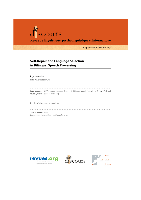
Discours-Revue de Linguistique Psycholinguistique et Informatique
Scope & Guideline
Unlocking the Secrets of Language through Interdisciplinary Research.
Introduction
Aims and Scopes
- Discourse Analysis:
The journal emphasizes the study of discourse across various contexts, examining how language constructs meaning, identity, and power relations in society. - Linguistic and Semiotic Methodologies:
It employs diverse methodologies from linguistics and semiotics to analyze texts and discourses, reflecting on their implications for understanding social issues. - Cultural and Social Identity:
Research often focuses on how language reflects and constructs cultural identities, particularly in the context of Francophone literature and social movements. - Political and Public Discourse:
The journal frequently addresses the role of discourse in political contexts, analyzing how language influences public perception and policy. - Ethos and Identity Construction:
A recurring theme is the exploration of ethos—how authority and credibility are constructed through discourse, impacting societal narratives.
Trending and Emerging
- Digital Discourse and Social Media:
There is a growing interest in analyzing discourse within digital platforms, particularly social media, exploring how these mediums influence public discourse and identity construction. - Environmental Discourse:
Research focusing on environmental issues and discourse, especially in the context of youth activism and global movements, has gained traction, reflecting the importance of ecological themes in contemporary society. - Populism and Political Rhetoric:
An increasing number of studies are dedicated to analyzing populist discourse and its rhetorical strategies, particularly in relation to recent political developments worldwide. - Interdisciplinary Approaches to Discourse:
Emerging themes indicate a trend towards interdisciplinary studies that combine insights from linguistics, political science, psychology, and cultural studies to provide a holistic view of discourse. - Crisis Discourse Analysis:
Research examining how crises (e.g., health, political) are communicated through discourse has become prominent, particularly in light of the COVID-19 pandemic and its implications for authority and legitimacy.
Declining or Waning
- Traditional Literary Analysis:
While literary analysis remains important, there is a noticeable decline in papers focused solely on traditional literary critique without integrating discourse analysis or sociolinguistic perspectives. - Historical Discourse Studies:
Research that strictly focuses on historical discourses without contemporary relevance is becoming less frequent, indicating a move towards analyses that connect past discourses to current social issues. - Niche Linguistic Phenomena:
Studies on very specific linguistic phenomena or isolated case studies are less prominent, suggesting a shift towards broader, interdisciplinary approaches that connect various discursive practices.
Similar Journals
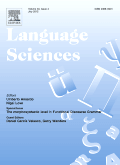
LANGUAGE SCIENCES
Exploring the Depths of Linguistic InnovationLANGUAGE SCIENCES, published by Elsevier Science Ltd, stands as a prominent journal in the field of linguistics and language studies. With an impressive impact factor that solidifies its reputation, it holds a Q1 ranking in both the linguistics and language categories for 2023, reflecting its excellence and relevance in cutting-edge research. Since its inception in 1979, this journal has evolved to encompass a wide range of interdisciplinary studies, providing a platform for innovative research that addresses the complexities of language use, acquisition, cognition, and social interactions. The journal is hosted in the United Kingdom and features rigorous peer-reviewed articles that contribute significantly to both the academic community and practical applications in language-related fields. With access options tailored for a diverse range of readers and contributors, LANGUAGE SCIENCES invites scholars, students, and professionals to engage with its comprehensive body of work and contribute to the ongoing discourse in linguistics.
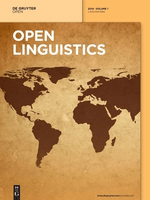
Open Linguistics
Unleashing the power of language studies for all.Open Linguistics is a premier open access journal dedicated to advancing the field of linguistics, published by DE GRUYTER POLAND SP Z O O. Since its inception in 2014, the journal has consistently provided a platform for innovative research and critical discourse in various subfields of linguistics. With an impressive Q1 ranking in the linguistics category as of 2023, Open Linguistics is recognized for its significant contributions, ranking #223 out of 1088 in Arts and Humanities, as well as achieving a commendable #260 out of 1167 in Social Sciences. The journal's open access policy ensures that research is freely accessible to both scholars and practitioners, fostering a collaborative and inclusive academic community. With a focus on original research, reviews, and theoretical papers, Open Linguistics is positioned as an essential resource for researchers, educators, and students seeking to deepen their understanding of language and its diverse applications in society.
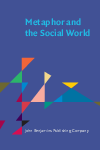
Metaphor and the Social World
Advancing Insights into Metaphor and CultureMetaphor and the Social World is a premier journal in the field of linguistics and language studies, published by JOHN BENJAMINS PUBLISHING CO. With its ISSN 2210-4070 and E-ISSN 2210-4097, this journal has carved a niche for itself since its inception in 2011, enjoying a strong reputation and an anticipated convergence period extending to 2024. Recognized in the Q1 quartile for linguistics, it ranks impressively within the Scopus Arts and Humanities category (#172/1088), placing it in the 84th percentile, and also holds a notable rank in the social sciences (#201/1167, 82nd percentile). The journal explores the intricate relationships between metaphorical language and social constructs, contributing valuable insights to both theoretical linguistics and practical applications. Its commitment to fostering scholarly discourse makes it an essential resource for researchers, professionals, and students alike, underlining the significance of metaphor in shaping our understanding of social interaction and cultural dynamics.

INTERNATIONAL JOURNAL FOR THE SEMIOTICS OF LAW-REVUE INTERNATIONALE DE SEMIOTIQUE JURIDIQUE
Charting New Territories in Law and LinguisticsINTERNATIONAL JOURNAL FOR THE SEMIOTICS OF LAW-REVUE INTERNATIONALE DE SEMIOTIQUE JURIDIQUE, published by Springer, stands as a vital intellectual platform within the interdisciplinary fields of law and linguistics. With an ISSN of 0952-8059 and an E-ISSN of 1572-8722, this esteemed journal has served the academic community since its inception in 1988 and continues to publish insightful research until 2024. Recognized in the 2023 rankings, it achieves Q2 status in Law and Q1 in Linguistics and Language, affirming its influence and relevance in scholarly discourse. Featuring a strong performance in Scopus rankings—comprising Rank #192 and Percentile 82nd in Language and Linguistics and Rank #254 and Percentile 75th in Law—this journal is curating high-quality contributions that explore the intersection of legal systems and semiotic theory. Despite having no open access option, it continues to disseminate important research that illuminates the semiotic dimensions of legal discourse, making it an invaluable resource for researchers, professionals, and students interested in the evolving landscape of legal and linguistic studies.
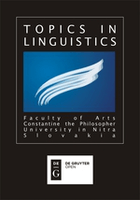
Topics in Linguistics
Connecting Scholars Across Linguistic DisciplinesTopics in Linguistics is a premier academic journal published by SCIENDO, specializing in the dynamic and expansive field of linguistics. With its Open Access model adopted since 2013, this journal ensures that groundbreaking research is readily accessible to scholars and enthusiasts alike, fostering collaboration and advancement in language studies. Indexed in prominent databases, it holds a Q2 ranking in the linguistics category for 2023, indicating its influence and relevance within the academic community. Hailing from Germany, the journal has established a strong international presence, ranking #291 out of 1088 in Arts and Humanities and #349 out of 1167 in Social Sciences—placing it in the top 25% of journals within these fields. Topics in Linguistics serves as a vital platform for researchers to disseminate innovative findings and engage with ongoing debates in the linguistics landscape, making it an essential resource for students, professionals, and academics committed to exploring the intricate layers of language and communication.
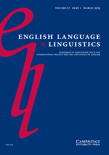
English Language & Linguistics
Illuminating the Pathways of Language UnderstandingEnglish Language & Linguistics is a prestigious journal published by Cambridge University Press, specializing in the dynamic fields of linguistics and language studies. With an impressive Q1 ranking in both Linguistics and Language categories for 2023 and a notable placement in the Scopus metrics, where it ranks #142 out of 1088 in Arts and Humanities, the journal is recognized for its high-quality research contributions and robust impact in the scholarly community. Since its inception in 1997, English Language & Linguistics has provided a forum for researchers to explore various aspects of language, facilitating the dissemination of innovative ideas and empirical studies. With no open access options currently available, the journal remains a valuable resource within the United Kingdom and beyond, fostering a deeper understanding of language intricacies and their broader societal implications. For practitioners and academicians alike, this journal is a critical resource for keeping abreast of the latest advancements in linguistics.
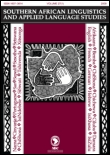
Southern African Linguistics and Applied Language Studies
Elevating Southern African Voices in Language StudiesSouthern African Linguistics and Applied Language Studies is a prestigious journal dedicated to the exploration and analysis of linguistics and applied language studies within the Southern African context. Published by Taylor & Francis Ltd, this esteemed journal has established itself as a significant platform for scholars and practitioners since its inception in 2003. With an impressive Q2 ranking in the Linguistics and Language category and a current Scopus rank of #430 out of 1167, it occupies a vital position in the academic landscape, appealing to a diverse readership keen on linguistic research, language policy, and applied linguistics. While the journal is not currently open access, it provides comprehensive insights and scholarly articles that foster understanding and innovation in linguistic practices and language education. As of 2024, the journal continues to deepen its impact through rigorous peer-review and a commitment to advancing knowledge, making it a key resource for researchers, educators, and students seeking to navigate the complexities of language within the Southern African region and beyond.
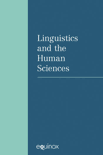
Linguistics and the Human Sciences
Exploring the Intersection of Language and HumanityLinguistics and the Human Sciences is a prominent academic journal published by EQUINOX PUBLISHING LTD that delves into the intricate relationship between linguistics and various aspects of human life, culture, and society. Designed to serve as a platform for innovative research and interdisciplinary dialogues, this journal explores themes that span cognitive science, sociolinguistics, applied linguistics, and more, making it an invaluable resource for researchers, professionals, and students interested in the dynamic interplay between language and human experience. Although specific metrics such as impact factor and H-index are not available, the journal's commitment to advancing linguistic scholarship ensures its relevance and importance within the field. As an esteemed publication based in Sheffield, England, Linguistics and the Human Sciences seeks to foster accessible research through a non-open access model that maintains rigorous academic standards, ultimately contributing to the ongoing discourse in linguistics and its humanistic implications.

Cadernos de Estudos Linguisticos
Innovating the study of language for tomorrow's scholars.Cadernos de Estudos Linguisticos, published by UNIV ESTADUAL CAMPINAS, INST ESTUDOS LINGUAGEM, stands as a pivotal platform in the field of linguistic studies since its inception in 1978. With its commitment to Open Access, this journal fosters the dissemination of cutting-edge research, ensuring that knowledge is accessible to a global audience. This also enhances collaboration among researchers, professionals, and students dedicated to exploring the nuances of language. The journal proudly carries the ISSN 0102-5767 and E-ISSN 2447-0686, attesting to its uninterrupted quality and relevance in linguistic scholarship. By addressing various facets of language studies, including syntax, semantics, and sociolinguistics, this esteemed journal is a vital resource for advancing understanding and innovation in the field.

Cuadernos de Linguistica Hispanica
Connecting Scholars Through Open Access Linguistic ResearchCuadernos de Linguistica Hispanica is a distinguished open access journal published by UNIV PEDAGOGICA & TECNOLOGICA COLOMBIA, dedicated to advancing research in the field of linguistics and language studies since its inception. With an ISSN of 0121-053X and E-ISSN 2346-1829, this journal has established itself as an important platform for scholars to share innovative findings and insights within the linguistics community. As a Q3-ranked journal in linguistics and language according to 2023 category quartiles, it occupies a significant position in Scopus rankings, showcasing its commitment to quality and relevance. With the aim to foster scholarly discourse and promote understanding of the Hispanic linguistic landscape, the journal welcomes contributions that explore a diverse range of topics and methodologies. The journal has embraced open access since 2008, ensuring that research is accessible to a broader audience, thus enhancing its impact and engagement within both academic and professional spheres.